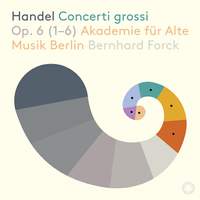Recording of the Week,
Handel's Concerti Grossi Op. 6 from the Akademie für Alte Musik Berlin
My Recording of the Week is the Akademie für Alte Musik Berlin’s lively collection of Handel’s Concerti grossi Op. 6 (Nos. 1-6) with Bernhard Forck, its leader of 35 years’ standing. On the face of it, it’s purely orchestral music that might seem to belong in the concert-hall, but quickly turns out to be wearing its theatrical origins as a badge of pride. Written for use between the acts of the new oratorio form which the composer was busily inventing at this time, in spirit and style it’s not unreasonable to see these concerti as instrumental intermezzi for the theatre, and Forck’s musicians respond accordingly with extroverted and multi-faceted playing.
 Handel is here consciously imitating Corelli (in a bid, it’s widely supposed, to imitate the latter’s runaway success on the London musical scene of the time). There’s a definite Italianate feel to the concerti – this is of course partly down to Handel’s own writing, but I think equally due to the performances, which seem very much geared towards bringing out this side of the music. The soloist group in particular seems to relish the Corelli-derived virtuosity that their parts incorporate, as their dashing scalar runs and trills in the final movements of Nos. 4 and 5 attest.
Handel is here consciously imitating Corelli (in a bid, it’s widely supposed, to imitate the latter’s runaway success on the London musical scene of the time). There’s a definite Italianate feel to the concerti – this is of course partly down to Handel’s own writing, but I think equally due to the performances, which seem very much geared towards bringing out this side of the music. The soloist group in particular seems to relish the Corelli-derived virtuosity that their parts incorporate, as their dashing scalar runs and trills in the final movements of Nos. 4 and 5 attest.
For all that the Italian roots of the music seem to be foremost in Forck’s mind, the very first track gives the opposite impression, with a stately and sedate English mood worthy of the Coronation Anthems. This majestic opening dispensed with, we’re soon off and away with lively Corellian (almost Vivaldian) bustle, dynamic and instrumental contrasts parrying one another in a way that clearly shows Handel’s wonderful grasp of the vivacious Italian style. Whatever else you do, don’t miss the gleefully cheeky pianissimo figure that closes the penultimate movement of the first concerto; Handel seems by all accounts to have been quite jolly company, and little touches like this show his sense of humour expressing itself in his music too.
The slower movements of these concerti are some of the real highlights of the recording – particularly the quietly subdued Adagio from No. 1, the limpid tranquillity of No. 4’s Largo e piano (punctuated delightfully by the tasteful lute continuo of Miguel Rincón Rodriguez), and the wonderful pastoral richness of the Musette from No. 6, which would not sound out of place introducing the shepherds in Messiah, and yet also seems to keep half an eye on Corelli’s Christmas Concerto of a few decades previously.
Although I’ve picked out the moments of calm as particular highlights where the sensitivity of the Akademie’s playing is most clearly on display, there is naturally plenty of more active showmanship here too. The shade of Vivaldi perhaps looms largest of all in the interplay between solo violin (Forck himself, conducting from his instrument) and ripieno in the penultimate movement of No. 6, and the album comes to a close with some effortlessly nimble 9/8 footwork from the whole team.
Among these six concerti there’s a huge wealth of stylistic influences – French overtures, Italian and English dances of various styles – that must surely have been part of what Handel was trying to show off to his adopted homeland. If his aim in writing these concerti was to demonstrate his comprehensive mastery of the styles that were in vogue in early eighteenth-century London then I don’t think there can be any doubt of his success; still less when you hear the way the Akademie für Alte Musik Berlin bring these colourful works to life. The next two instalments in this planned Handelian trilogy (the remaining Op. 6 concerti and Op. 3) will definitely be recordings to watch out for!
Akademie für Alte Musik Berlin, Bernhard Forck
Available Formats: MP3, FLAC, Hi-Res FLAC



